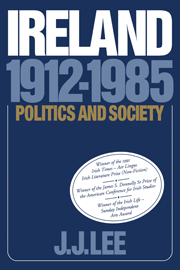Book contents
- Frontmatter
- Contents
- List of maps
- List of tables
- Preface
- Acknowledgements
- List of abbreviations
- Note on nomenclature
- 1 REBELLION: 1912–1922
- 2 CONSOLIDATION: 1922–1932
- 3 EXPERIMENT: 1932–1945
- 4 MALAISE: 1945–1958
- 5 EXPANSION: 1958–1969
- 6 NORTH: 1945–1985
- 7 DRIFT: 1969–?
- 8 PERSPECTIVES
- Select bibliography
- Index
3 - EXPERIMENT: 1932–1945
Published online by Cambridge University Press: 05 June 2012
- Frontmatter
- Contents
- List of maps
- List of tables
- Preface
- Acknowledgements
- List of abbreviations
- Note on nomenclature
- 1 REBELLION: 1912–1922
- 2 CONSOLIDATION: 1922–1932
- 3 EXPERIMENT: 1932–1945
- 4 MALAISE: 1945–1958
- 5 EXPANSION: 1958–1969
- 6 NORTH: 1945–1985
- 7 DRIFT: 1969–?
- 8 PERSPECTIVES
- Select bibliography
- Index
Summary
THE IMPACT OF DE VALERA
Nothing so became Cosgrave in office as his manner of leaving it. There were widespread fears that the government, or the army, would attempt a preemptive coup to forestall the feared revenge of their civil war enemies. Saner counsels prevailed. For a government that based its legitimacy on majority rights to have rejected a majority verdict would have confirmed the charge of Irish incapacity for democratic self-government that Cosgrave was determined to refute. His regime was the victim of its own success. A coup would now involve an assault on an established tradition of stability. It could not be excused as the alternative to anarchy of the type that tempted Pilsudski to seize power in Poland in 1926, or King Alexander to suspend the Vidovdan constitution in Yugoslavia in 1929.
If Cosgrave ever contemplated a coup, he had taken peculiar preparatory steps. He succeeded to a remarkable degree in taking the army out of politics. After completing the first demobilisation drive in March 1924, he further reduced the size of the army from 13000 in 1924 to only 6000 in 1931, and reduced the number of colonels from 28 in 1926 to 11 in 1931. Michael Brennan, the new Chief of Staff, promoted after a protracted cabinet meeting in October 1931, was probably the most conciliatory possible appointment. Richard Mulcahy, a key figure in any projected coup, had firmly demonstrated his commitment to democracy.
- Type
- Chapter
- Information
- Ireland, 1912–1985Politics and Society, pp. 175 - 270Publisher: Cambridge University PressPrint publication year: 1990



